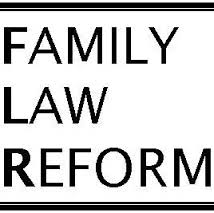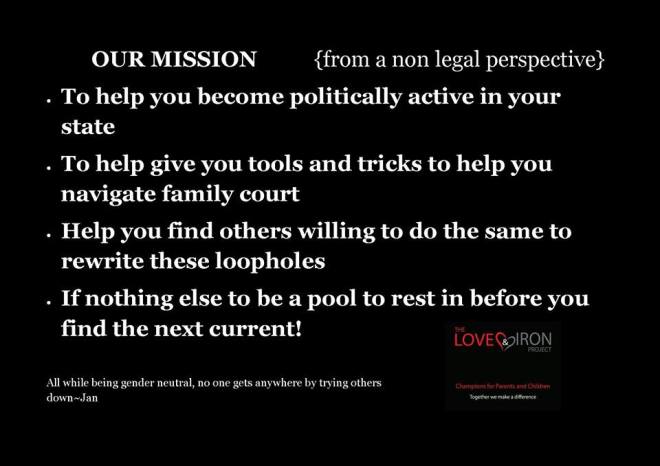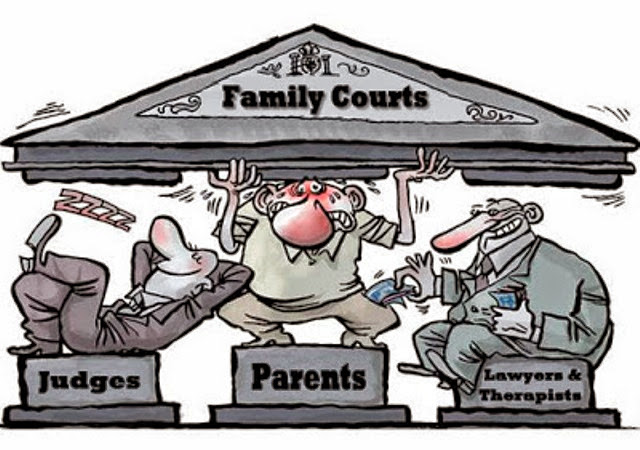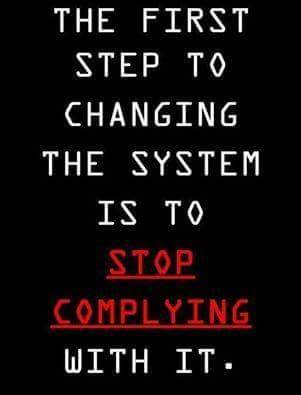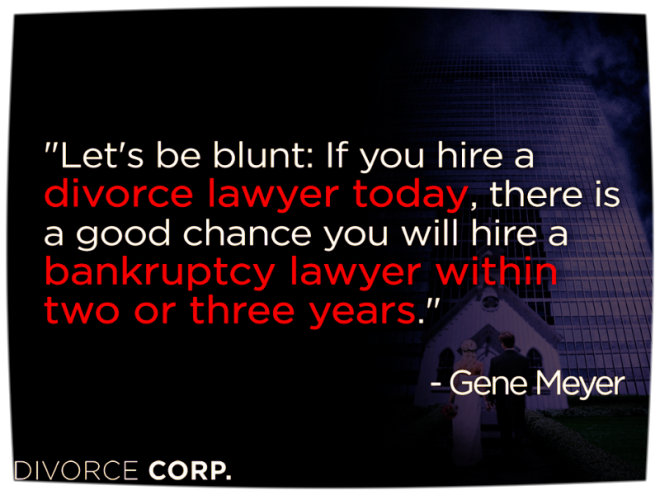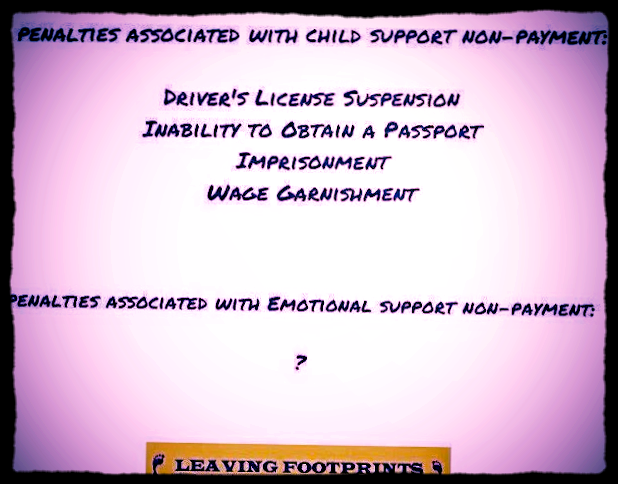Re-blogged from ~
Parenting Together….Living Apart
 In working to reforming our current system, I meet great people on a daily basis who see unfairness.
In working to reforming our current system, I meet great people on a daily basis who see unfairness.
I am not alone in this, of course.
Today’s post is from a Division of Child Support case worker in a neighboring state who has contacted me several times concerning South Dakota’s unfair custody laws. She asked to post anonymously as she believes she could lose her job if her superiors knew of her stance. So I post this, humbled she would take that risk and grateful for her insights. I believe you will be too.
This is from the front lines of child support and custody in South Dakota and neighboring states. Our anonymous writer today works with custody and child support on a daily basis.
Here is her unedited letter:
“I am a Division of Child Support Caseworker in a state bordering South Dakota. As such, I speak with other caseworkers in SD and nearly all other states in the US every day, and know there are very few options for “non-custodial” parents who are being denied equal access to their children, unless they are fortunate enough to be able to afford a long and expensive custody battle, which is extremely rare, especially in cases where the parents were never married.
While your group needs to pursue one issue at a time, your particular issue being custody and visitation arrangements after a divorce, I hope that you will also pursue shared parenting and child support arrangements for parents who were never married, as this is an issue that definitely needs to be addressed and rectified.
Before continuing, I will say that I, and all DCS caseworkers, recognize that the “non-custodial” (and we don’t like that term) parent may be the mother rather than the father. In most cases, however, the NCP is dad and the CP is mom, so please forgive my use of general terms such as “she” and “he”. I use them for the sake of simplicity, not out of a lack of respect or understanding that mothers do sometimes get the raw end of the deal, along with their children.
In every state in this country, the child support system is not only broken, but is in desperate need of repair. It is unbalanced and very often unfair. The child support calculation is based on the income of both parents, in every state, although I will admit there could be a state or two that does not do it this way and I am just not aware.
In most states, if either parent is unemployed but not disabled, they are presumed to be capable of working 40 hours a week at minimum wage, so their income is imputed at $1275 per month. Following this calculation, if mom is willingly unemployed and dad is employed full time, making a mere $10 an hour, dad has a child support obligation of $357 per month for one child. (I got this number from SD’s child support calculator website and it is accurate.)
Every parent, regardless of the relationship (or lack of one) that existed at the time the child was conceived, has a responsibility to provide financial support for their child.
That is a fact. But, should dad, making $10 an hour really be forced to pay $357 to someone who is not willing to work? Where is mom’s responsibility in this? In these situations, mom (unless she is actually working 40 hours a week for minimum wage, which is rare), is receiving food stamps, Medicaid, and housing assistance, so she is sitting back, living a meager life and doing nothing to improve the lives of her children, and not having to lift a finger to do it. In the meantime, dad is working hard and still can’t afford to keep the lights on in his own home.
Most of the dads I speak to are willing to pay the child support, despite the financial stress. They understand that there is a little person out there who needs their help, and they are okay with that. In many of these cases, dad has not seen his child even once since the relationship with his child’s mother demised, and he has no recourse other than to hire a lawyer to get a visitation order. The first problem with this is that dad, making $10 an hour and paying $357 a month in child support has no money left over for to hire a lawyer. The second problem with this is that, even when he does and gets the order, mom can still deny the visitation and there will be no consequences to her for doing so. Sure, dad can take her back to court again, and the judge will tell her to behave, but if she doesn’t, nothing will happen in SD. Dad and the kids are still denied access to one another.
Approximately 2 years ago, the state of Illinois passed legislation that actually puts repercussions in place for CPs that refuse to follow the Illinois State Visitation Guidelines. If the CP denies access to the children to the NCP, her driver’s license can be restricted, and not be reinstated until she complies. What a novel idea. I am beside myself, wondering why every state has not enacted this legislation. We restrict, suspend, or revoke the driver’s licenses (and other licenses) of NCPs when they don’t pay the child support, even when they are unwillingly unemployed, yet we allow CPs to use their children as weapons against NCP, regardless of whether he is paying.
I had two office visits today, both from dads who are doing the best they can and still are being denied access to their children, simply because mom decided she doesn’t like them anymore. The first has a 5 year old daughter that he desperately wants to have a relationship with, but hasn’t been allowed to see since she was 1 year old. At least in that situation, the poor child doesn’t know what she’s missing in not being able to see her dad. The second is much more sad, and it honestly makes me very angry. Dad raised mom’s first child as his own from an infant to 4 years old. In the meantime, they had a child together. They were together for another year or two. For the next several years, dad had BOTH kids – even the one that was not his – for weekend visitation. Not enough, but at least it’s something. Then, mom decided to pull the rug out from underneath dad, with no consideration for her children. Dad has now not seen either child for a year and a half. He and mom were not married, so mom has all the power, unless he can afford an attorney, which he can not possibly afford to do.
As we sat and talked, there were several times that I could see he was struggling not to cry. Ever since mom decided (for what crazy reason no one knows) to withhold visitation, both children, and especially his biological child, have been acting out in school. They’ve been bullying other kids and being defiant to authority. His biological son was finally allowed to see his half sister (that dad had from another relationship) after being denied access to her for a long time.
According to his sister, all he talked about was how much he missed his dad and how he is so happy he has all these things that his dad gave him, because it helps him remember his dad. Mom has the kid in therapy, that dad is paying for, and she is apparently oblivious to the reason why the kid needs therapy. I could tell her, but it would probably result in me being fired. Mom has 3 kids by 3 different dads and I would like to talk to her about that as well. Bottom line is mom is sitting back, collecting child support and state benefits, and not doing a damn thing to support her children, but she will be the first to call if a payment is a day late. This is just one case I am telling you about, and it’s not even the worst one; it’s just the one at the top of my mind.
The bottom line is this. We need to have state agencies that provide free services for NCPs to have fair and equal access to their children. We already have state agencies that help people who make no contribution themselves collect child support, and we are screwing kids and NCPs in the process. That is not acceptable in any state. I hope your legislature – and mine – will figure that out. Good luck and God Bless to you and your children.
All that being said, I hope all the NCPs (I really hate that term) understand that your CS case worker is not against you. We are forced to support the order, whatever that may entail. We have no power to help you with anything else, but we really would like to. God bless and God speed to you and your children.”
Stop The War On Dads No parents should have to go through this
Invite people ~ Share this community
The father’s rights movement isn’t an anti-mom or anti-woman movement; it’s an anti-unfairness movement. Our aim is to champion the cause of equal parenting, family law reform and equal contact for divorced/separated parents with their children. The fathers’ rights movement is a movement whose members are primarily interested in issues related to family law, including child custody and child support that affect fathers and their children. Many of its members are fathers who desire to share the parenting of their children equally with their children’s mother—either after divorce or as unwed fathers, and the children of the terminated marriage. The movement includes women as well as men, often the second wives of divorced fathers or other family members of men who have had some engagement with family law. Most of the members of the fathers’ rights movement had little prior interest in the law or politics. However, as they felt that their goal of equal shared parenting was being frustrated by the family courts, many took an interest in family law, including child custody and child support.
Though it has been described as a social movement, members of the movement believe their actions are better described as part of a civil rights movement. Objections to the characterizations of the movement as a social movement are related to the belief that discrimination against fathers moves beyond the social sciences and originates in government intervention into family life. The movement has received international press coverage as a result of high profile activism of their members, has become increasingly vocal, visible and organised, and has played a powerful role in family law debates.
The child is not the mere creature of the State; those who nurture him and direct his destiny have the right, coupled with the high duty, to recognize and prepare him for additional obligations.” – Pierce v. Society of Sisters, 268 U.S. 510 (1925)
“It is cardinal with us that the custody, care and nurture of the child reside first in the parents, whose primary function and freedom include preparation for obligations the state can neither supply nor hinder…. It is in recognition of this that these decisions have respected the private realm of family life which the state cannot enter.” – Prince v. Commonwealth of Massachusetts, 321 U.S. 158 (1944)
“The Due Process Clause does not permit a State to infringe on the fundamental right of parents to make childrearing decisions simply because a state judge believes a ‘better’ decision could be made.” – Troxel v. Granville, 530 U.S. 57 (2000)
Read more
Continue reading “Every parent, regardless of the relationship (or lack of one) that existed at the time the child was conceived, has a responsibility to provide financial support for their child.”

